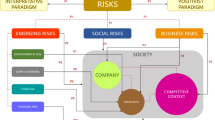Abstract
At the start of the 21st century, Corporate Social Responsibility (CSR) seems to have great potential for innovating business practices with a positive impact on People, Planet and Profit. In this article the differences between the management systems approach of the nineties, and Corporate Social Responsibility are analysed.
An analysis is structured around three business principles that are relevant for CSR and management systems: (1) doing things right the first time, (2) doing the right things, and (3) continuous improvement and innovation. Basically CSR is focussing on the second principle, and management systems focus on the first. However, CSR is very likely to build on the management systems as well.
From a CSR point of view, the existing generation of management systems with their focus on rational control (= doing things right) can only be of limited use in the development of CSR. However, the preventive rationalities of management systems are important. Values and the principle doing the right things is extremely relevant for CSR. This goes far beyond the present generation of ISO type management systems; opportunities stem from building on TQM approaches like the EFQM Business Excellence model. Continuous improvement and innovation is a permanent challenge underlying the two other business principles, and requires both individual and organisational learning processes. In the present generation of management systems, continuous improvement mainly addresses rational prevention, barely the value aspects of business.
For the further development and implementation of CSR, each of the three business management principles are vital. There is a need for a new generation of management systems that addresses the values at stake in strategic decision-making, both at company level and in the behaviour of individuals, while the rationalities of prevention and anticipation are still relevant. In both directions more emphasis for continuous learning and innovation will be needed.
CSR is likely to trigger the development of management systems in the directions mentioned. This will support companies to be credible and transparent in improving the performance with respect to people, planet and profit.
Similar content being viewed by others
References
BECRC: 2000, Business Ethics & Compliance Research Center, Reitaku University (R-BEC), Ethics Compliance Management system Standard (ECS2000 v 1.2), http://ecs2000.reitaku-u.ac.jp.
Benne, K. D. and R. Chin: 1986, 'Een typologie van veranderingsstrategieën (a Typology of Strategies for Planned Change)', in A. J. Cozijnsen and W. J. Vrakking (eds.), Handboek voor strategisch Innovaren; een internationale balans (Kluwer/Nive, Deventer).
Conti, T.: 1993, Building Total Quality (Chapman & Hall, London).
EC: 2002, Communication from the Commission Concerning Corporate Social Responsibility: A Business Contribution to Sustainable Development, Commission of the European Communities, COM (2002) 347 final, Brussels.
GBL: 2002, 'Green Business Letter, Beyond EH&S; The Rise of CSR Leads Managers to Take a Broader Deeper View', The Green Business Letter (February), 1-7.
ISO COPOLCO: 2002, ISO Consumer Policy Committee, The Desirability and Feasibility of ISO Corporate Social Responsibility Standards, Final Report, May 2002, ISO, Geneva.
Juran, J.: 1988, Juran on Planning for Quality (The Free Press, Mc Millan, New York).
Van Marrewijk, M.: 2003, Multiple Levels and Interpretations of Corporate Sustainability (this issue).
Zwetsloot, G. I. J. M. and J. T. Allegro: 1994, 'Organisatie verandering door management systemen voor voortdurende verbetering (Organisational Change through Management Systems for Continuous Change)', Gedrag en Organisatie 7(6), 352-366.
Zwetsloot, L.: 1999, Naar een inherent veiligere, gezondere en schonere productie (Towards Inherently Safer, Healthier and Cleaner Production), Inaugural lecture, Erasmus University Rotterdam.
Zwetsloot, G. I. J. M.: 2001, 'The Management of Innovation by Frontrunner Companies in Environmental Management and Health & Safety', Environmental Management and Health 12(2-3), 207-214.
Author information
Authors and Affiliations
Rights and permissions
About this article
Cite this article
Zwetsloot, G.I.J.M. From Management Systems to Corporate Social Responsibility. Journal of Business Ethics 44, 201–208 (2003). https://doi.org/10.1023/A:1023303917699
Issue Date:
DOI: https://doi.org/10.1023/A:1023303917699




